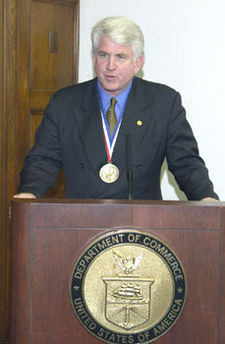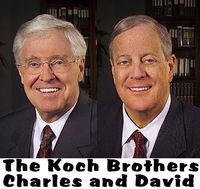
His concept of an "Ethernet" is at the heart of your local area network. Ethernet concepts are rolled all over the Internet, and most scaled Web hosts move their data around with it. There are now Ethernet standards running to 10 GBps.
Metcalfe created 3Com in 1980 to commercialize his concept, and while his performance was fine his board kicked him out 10 years later for Eric Benhamou. As with some of my firings, this was probably a blessing in disguise.
Metcalfe's mind is too big, and too wide-ranging, to be locked inside an office. He's a walk around, fly around kind of guy who can do anything. He spent the 1990s as a pundit and journalist, and has spent most of the last decade as a venture capitalist and eminence grise at UT-Austin. I keep hoping he'll "retire" to my alma mater, Rice University in Houston, where he can drive the world's energy giants deeper into the renewables space, but that's just my personal dream for him. At 64 he's still young enough to have dreams of his own.
Metcalfe is the first subject of our new feature, The 1971 Game. In past years I've spent time comparing figures of the present with those of the past, based on my belief that the crisis of our time is a reverse of what happened in the late 1960s. This made Barack Obama into a Bizarro Nixon. It also made figures of what became the Tea Party movement into Bizarro Hippies and Yippies. All this was fun, but in the end it doesn't really explain what was behind the change.
What my research began to reveal last year is that even the changes of the 1960s, which seemed entirely social and political, were in fact economic. And that this pattern of political change driven by economics has in fact repeated itself, time-after-time in our political history.
What makes America great is that it's a business culture. We are not ideological people. We do what works. But what aging, fading industries learned long ago is that they could hang on to economic power by capturing the political process. This is what southern planters did in the 1850s, what railroad barons did in the 1890s, what utility producers did in the 1920s, what manufacturers were actually doing in the 1960s. (What's good for Gemeral Motors is good for the USA.)
Since you can't win an election by running against economic progress, fading industries have spent immense sums creating a host of ancillary issues, associating themselves with causes that appear far afield from what they're about, but whose political alliances magically end up supporting their economic aims.
Which brings us to the present day.

Why would these people want to maintain the past? It's not for the reason you think. It's simply to protect, and enhance, the value of their most important asset — proven reserves. What they get for current production is not nearly as important as the value of the assets backing them. Raising the value of the asset is their true political cause.
Fighting the Koch Brothers on the political front lines is a bit like wrestling alligators. The way to drain the swamp is to replace their growing scarcity with a new abundance. It's to finally move from caveman energy — looking for stuff to burn — to harvesting the energy all around us.
At some point a tipping point will be reached , as reserve values decline, and the Koch's world will collapse. But well before that happens a huge industry has to be created. It's the creation of that industry that's the chief story of our time, and the one I'm now most anxious to follow.
My most important conclusion is that, in terms of the most important renewable source, the Sun, we're right about where computing was in 1971. You can buy the solar equivalent of a mini-computer by financing the erection of solar panels on your roof. The low-end of the market, the equivalent of an old TI calculator, is literally a small solar panel that can power your TI calculator, or other gadgets — such panels are available on many sites for a few hundred dollars.
But let's get back to Metcalfe. You'll remember that he is best known for his contributions to computer networking, which is vital to modern computing. Ironically his first doctoral dissertation in this area was rejected by Harvard.
So who's Bob Metcalfe now?

Metcalfe has made the connection between Internet design and what has to happen to our electric grid, top-to-bottom. So his "other" job is as chairman of Ember, a company using Zigbee — very low-power, very short-range signals run on WiFi frequencies — and software to enable communication about energy status among a vast array of devices.
Most of these systems are sold to the existing building automation market. A developer who can promise energy efficiency can save himself and his tenants a lot of money, and having a technology that lets tenants save money as well is also very, very cool.
But these are early days. It's Metcalfe who coined the "Enernet" term Al Gore was tossing around several years ago. That may or may not be the final word in terms of grid terminology. Ember may or may not be working on the final system. But they're working on the problem, and that's what makes Bob Metcalfe, today, as important as the Bob Metcalfe of yesterday.
He's one of my all-time heroes, and he deserves to be one of yours.










Really Good Job,! keep it Up
Really Good Job,! keep it Up